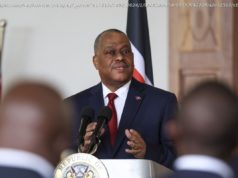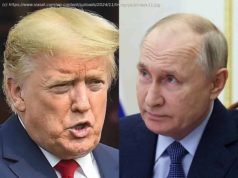There’s more to oversight than Russia investigations.
As the #MeToo moment sweeps through American life, deposing prominent journalists, film stars, Hollywood producers, celebrity chefs, and members of Congress, it’s getting harder to look away from the elephant in the Oval Office: Donald Trump.
While Trump’s misconduct in this regard is often shorthanded with references to the infamous Access Hollywood tape in which he was recorded telling a casual acquaintance that he likes to grope women, the actual charges against him are far more serious than crude talk. More than a dozen women have told stories of Trump reaching up skirts, grabbing breasts and butts, kissing women who were attempting to have professional interactions with him, and peeking in on beauty pageant contestants — often teenagers — while they were in various states of undress.
Sens. Kirsten Gillibrand (D-NY), Cory Booker (D-NJ), Jeff Merkley (D-OR), and Bernie Sanders (I-VT) have all called for Trump to step down in the wake of Al Franken’s resignation from the United States Senate. Obviously, that’s not going to happen. And it’s equally obvious that Congress isn’t going to move forward with impeachment proceedings either.
But that doesn’t mean Congress can’t — or shouldn’t — do anything. These are very serious allegations that have been made against Trump. And Trump has made the equally serious countercharge that he is the victim of a vast conspiracy of lies aimed at bringing him down. Whichever story is true, it’s a huge deal. And rather than leaving it as a mystery, Congress ought to use its considerable investigative powers to try to get to the bottom of it.
Just a few weeks before Election Day 2016, Trump was threatening to sue his accusers for libel .
Nobody in the legal world ever took that threat very seriously, but it served an important political purpose. Millions of Americans with deeply rooted attachments to conservative politics would never think of themselves as the kind of people who would vote for a man who sits down for an interview with a reporter assigned to do a profile on the first-year anniversary of his marriage, pins the reporter against a wall, kisses her and sticks his tongue into her mouth when the kiss was unreciprocated, and then says, “We’re going to have an affair.”
What those people needed to cast their customary vote for the Republican Party presidential nominee was a psychological respite. The Trump campaign delivered part of that by reminding the public of Bill Clinton’s sins, in order to make liberal pleas for conservatives to abandon their candidate seem phony. And they delivered the other part with the libel threat — maybe the women were lying.
Maybe Natasha Stoynoff was just making up that story about what happened with her Trump profile. Maybe Kristin Anderson was lying when she said Trump reached up her skirt and touched her through her underwear at a nightclub. And maybe Jessica Leeds was lying when she described a similar series of events on an airplane. Maybe Mindy McGillivray and Ninni Laaksonen were both lying about butt-grabbing incidents.
Maybe. After all, Trump said it was all lies and he would prove that in court after the election.
Of course, in reality Trump hasn’t sued anyone, because he knows perfectly well that he can’t prove they were lying. And the simplest, most basic way a congressional inquiry could advance the story would be by inviting the 16 women who made charges against Trump during the campaign to tell their stories on the record, under oath. Sworn testimony of that sort won’t prove a case in criminal court, but it certainly counts as an important form of evidence, and neither Congress nor the public needs to hold itself to that high standard. And beyond victim testimony, Congress’s investigative powers could accomplish many things that journalism alone cannot.
In appearances on Howard Stern’s radio show, Trump has openly bragged that one of the benefits of owning a set of beauty pageants was his ability to go strolling through dressing rooms to check out naked models.
An October 12 BuzzFeed report by Kendall Taggart, Jessica Garrison, and Jessica Testa indicates that this habit extended to the Miss Teen USA pageant, which featured contestants between the ages of 15 and 19. The reporters were not, however, able to get every contestant who was there to speak to them. Nor do they appear have succeeded in getting other people who worked for Trump at the pageant to talk. That’s not surprising in light of the stringent nondisclosure agreements that Trump routinely imposes on his staff.
Unlike journalists, congressional committees can issue subpoenas and compel people to talk.
Perhaps more importantly, Congress is uniquely situated to clarify the potential illegality of NDAs that purport to prevent current and former employees from discussing misconduct, and to alter federal law, if necessary, to allow people who’ve worked for Trump in the past to answer questions honestly.
And of course a proper investigation would give Trump a chance to clear his name in a way that dueling media accounts never can.
Congressional Republicans have largely been silent on the question of Trump’s sexual abuse. Back when the campaign was in full bloom and nearly everyone expected Trump to lose the election, well over a dozen Republican members of Congress said they wouldn’t vote for him in an effort to boost their own political fortunes. But then Trump unexpectedly won, and Republican members of Congress set about assiduously avoiding any form of meaningful executive branch oversight.
If Trump is, in fact, innocent and the accusers are, in fact, lying, congressional Republicans’ attitude toward this matter is doing the president a great disservice.
Perhaps Trump accusers who’ve been happy to smear him in the press would shy away from repeating their allegations under oath.
In an official statement released Monday, the White House vaguely alleged that the charges against Trump are “totally disputed in most cases by eyewitness accounts.” Nobody in the White House has produced eyewitnesses to dispute these claims over the course of the past 13 months, and today’s statement did not name any eyewitnesses or say exactly which cases they disputed. But if it’s true that there are eyewitnesses who can clear Trump’s name, then they too deserve to be heard on the record and under oath so he can get out from under this cloud.






